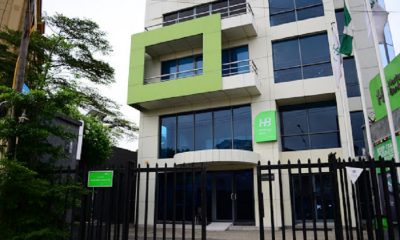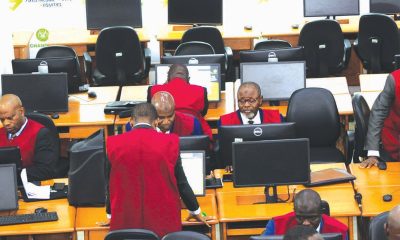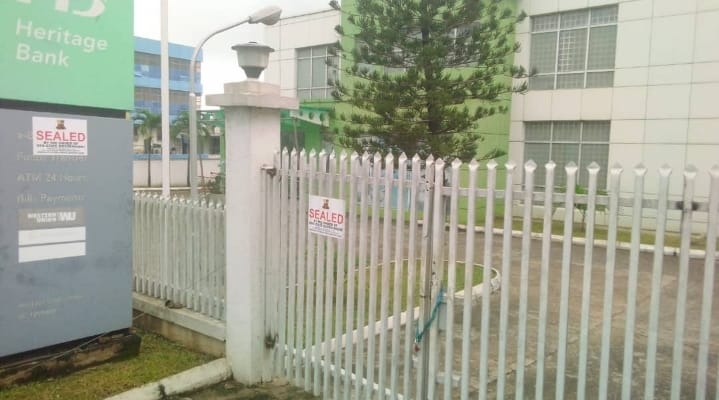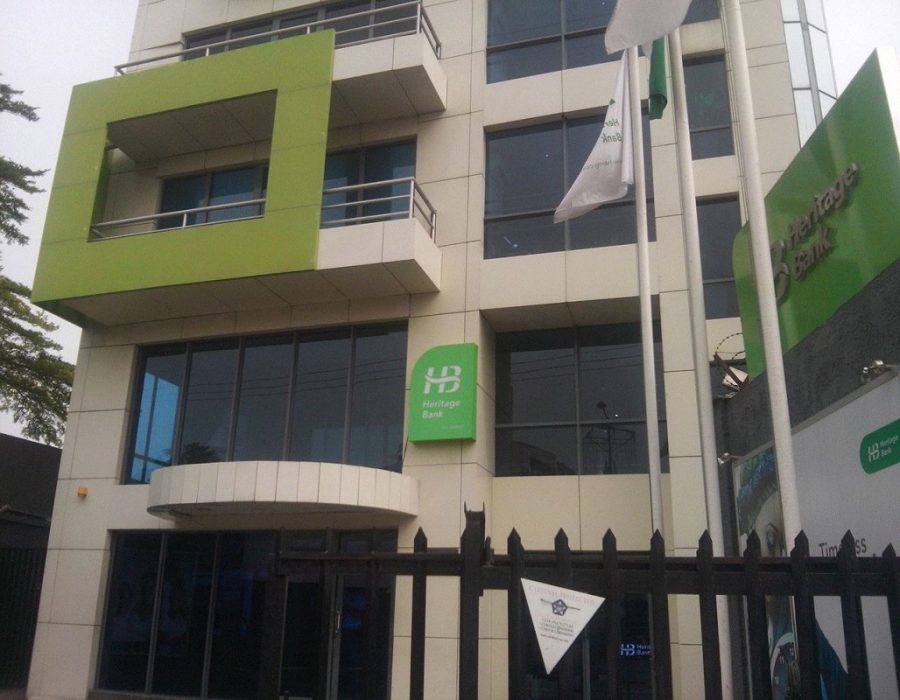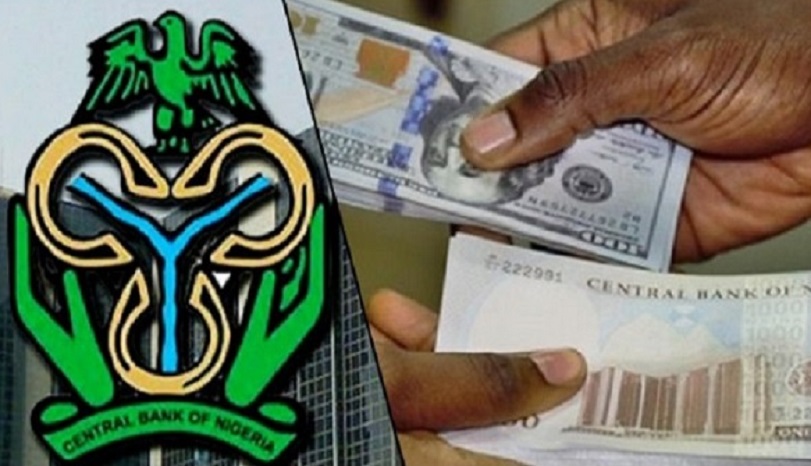Economy
Heritage Bank, LCFE Explore Commodities Market to Boost FX Liquidity

By Aduragbemi Omiyale
Recently, the Central Bank of Nigeria (CBN) launched a policy aimed to boost foreign exchange (FX) liquidity in the country with a policy known as the CBN RT200 FX Programme.
The scheme intends to generate about $200 billion in forex repatriation in the next three to five years through non-oil exports.
Nigeria, which is the largest economy in Africa, has mainly relied on the sale of crude oil for FX earnings and because of the global economic meltdown caused by the COVID-19 pandemic, it has not earned much, putting pressure on the Naira at the exchange rate market.
To help the apex bank achieve the forex repatriation goal, Heritage Bank Plc, Lagos Commodities and Futures Exchange (LCFE) and other participating financial institutions came together to explore opportunities on export revenue from the commodities market.
At a breakfast meeting organised by LCFE with bankers tagged The CBN RT200 FX Programme: and Potential of Export Revenue from the Commodities Ecosystem, representatives from Heritage Bank, FSDH, Agvest Limited, Novo Merchant Bank amongst others spoke on the matter.
Speaking on the opportunities for financial institutions in the CBN RT200 FX Programme, the Divisional Head, Agribusiness, Natural Resources & Project Development, Heritage Bank, Mr Olugbenga Awe, stated that the promotion of investment in commodities ecosystem by financial institutions in partnership with LCFE in its various assets traded in Agric commodities, energy and solid minerals would increase liquidity support from local commodity exportation to boost the race for the $200billion in FX repatriation and reduce the pressure on exchange rate.
Meanwhile, he identified challenges that expediently needed to be addressed which may likely hinder financial institution’s efforts on supporting the commodities ecosystem to drive the CBN’s RT200 FX target, such as inadequate export finance resources, lack of dependable source of local product prices, risk of haulage to bad roads amongst others.
Mr Awe explained that to significantly boost local production of exportable commodities and drastically reduce the country’s dependence on oil revenue, financial institutions must play the role of market markers to the Commodity Exchange (COMEX), thereby bringing liquidity to the exchange.
According to him, with COMEX as a risk mitigation platform, there is a need for the Warehouse (WR) finance structure to be registered with LCFE and the collateral management in place, which is within the parameters set by banks.
He further explained that banks must actively participate in crop receipts, liaise with their brokers to develop the value chain around a well market structure warehouse receipts systems (WRS).
This, he said would help stimulate demand amongst players from the aggregators, off-takers for standardized contracts that help deepen the value chain while providing financing that increased volumes traded.
Mr Awe, however, reiterated that promoting investment in commodities ecosystem via structured WR finance would bring about value addition to commodities with the help to moderate the prices, as the expected increase in demand would increase revenue export and make deposit money banks self-sufficient in meeting the FX needs of their customers.
The banker, who enumerated how financial institutions can partner with commodity exchange especially LCFE to deepen their footprints in various asset classes traded by LCFE, also referenced what Heritage Bank is doing in the Wheat Value Chain together with CBN investing N40 billion, which will scale up wheat production during harvest season.
According to him, whatever can be achieved in wheat can be replicated across the various value chains in rice, maize, others and ensuring that there is a link to the commodity exchange.
MD of LCFE, Mr Akin Akeredolu-Ale, who commended Heritage Bank for its sterling efforts in deepening its footprints in agribusiness, called on banks and other organisations to take advantage of the catalytic and transformational approach to support the CBN RT200 FX initiative.
He stressed that to achieve the target, there was a need for the creation and registration of Bank Commodity Desks with LCFE and Central Securities Clearing System (CSCS).
He noted that the stakeholders’ structure in financing the commodities ecosystem include Commodity Exchange, Commercial Banks, Non-Interest Banking, Merchant Bank.
Mr Akeredolu-Ale, who decried that the Nigerian economy was still import driven and depended largely on the export of petroleum to meet FX earnings, revealed that LCFE has lined up products such as commodity instruments, commodity-backed notes, Exchange-traded funds, Commodity Spot Contracts amongst others as a bumper for driving huge export revenue from commodities ecosystem to fast track the actualisation of $200 billion in FX repatriation.
Economy
Uzoka-Anite Warns Against Inflation Risks from Oil, Gas Earnings Surge

By Adedapo Adesanya
The Minister of State for Finance and chairman of the Federation Account Allocation Committee (FAAC), Mrs Doris Uzoka-Anite, has cautioned that a projected surge in oil and gas revenues following President Bola Tinubu’s latest executive order could trigger inflationary pressures and exchange rate volatility if not carefully managed.
She said that the recent executive order mandating the direct remittance of certain oil sector revenues to the federation account would provide regulatory clarity and significantly strengthen revenues accruing to the federation account, but warned that sudden liquidity injections into the economy may complicate monetary policy coordination with the Central Bank of Nigeria and erode the real value of allocations to federal, state and local governments.
While addressing members of FAAC in Abuja, Mrs Uzoka-Anite commended President Tinubu on the order, describing the development as a structural fiscal correction aimed at restoring constitutional discipline to petroleum revenue management and enhancing distributable income across the three tiers of government.
She said that the revenue outlook was improving due to ongoing structural reforms introduced by the Federal Government.
According to her, the newly implemented tax reform measures are broadening the tax base, improving compliance and enhancing administrative efficiency.
“Also, the executive order signed by Mr President on February 13 is reinforcing revenue discipline in the oil and gas sector and reducing leakages,” she said.
The minister said that the order suspends the 30 per cent allocation to the Frontier Exploration Fund (FEF) and suspends the 30 per cent management fee on oil and gas profit payable to NNPC Limited.
She said that the order also directed that gas flare penalties be paid into the federation account, and mandated full remittance of petroleum revenues without unconstitutional deductions.
Mrs Uzoka-Anite said that the reform marks a shift from a retention-based oil revenue model to a gross remittance, federation-first model.
“The implications for FAAC are very significant; more oil and gas profit will now flow directly into the federation account.
“Gas flare penalties will become distributable revenue, and previously retained management fees will no longer reduce remittable inflows,” she said.
She said that the reforms were expected to result in higher monthly gross inflows into the federation account, and increased allocations to federal, state and local governments.
The minister said that a retrospective audit of the FFF, the Midstream and Downstream Gas Infrastructure, was due, and NNPC management fee deductions could lead to recoveries that may provide a one-off fiscal boost.
She welcomed the improved revenue outlook and cautioned against the risks associated with sudden liquidity injections.
“Experience shows that when revenues rise sharply and are distributed fully and immediately, large liquidity injections can increase inflationary pressures, complicate monetary management and reduce the real purchasing power of allocations,” she said.
She said that excess aggregate demand, exchange rate pressure, asset price distortions and inflationary risks could arise if increased inflows were not carefully managed.
Mrs Uzoka-Anite said that to mitigate such risks, she proposed phased disbursement of one-off recoveries.
She suggested that retrospective recoveries be staggered rather than injected into the economy in bulk, with a portion temporarily warehoused in a stabilisation buffer.
She also recommended strengthening the excess crude and stabilisation buffer mechanism to channel part of incremental inflows into a fiscal stabilisation window.
“This could offset revenue shortfalls in weaker months and reduce procyclicality in spending.
According to her, enhanced coordination with the CBN would be pursued to align fiscal injections with liquidity management tools and support open market operations where necessary.
Mrs Uzoka-Anite urged states and federal Ministries, Departments and Agencies (MDAs) to prioritise capital expenditure over recurrent expenditure.
She called for investment in infrastructure, agriculture, energy and other productive sectors, and avoid unsustainable wage or consumption spikes.
“Productive spending expands supply capacity and mitigates inflation,” she said.
She also announced plans to introduce monthly revenue transparency dashboards, production-to-remittance reconciliation reporting, and clear reporting of incremental inflows arising from tax reforms and the executive order.
The junior finance minister said that the reforms presented an opportunity to deepen fiscal federalism, enhance distributable revenue, restore constitutional clarity and strengthen trust among tiers of government.
She also advised that increased revenue must not translate into fiscal complacency.
“We must resist the temptation to treat incremental inflows as permanent windfalls. We should reduce debt burdens, clear arrears responsibly, build buffers and invest in growth-enhancing sectors,” she said.
Economy
Dangote Refinery Shares to be Available to Public in Five Months

By Adedapo Adesanya
The chairman of Dangote Group, Mr Aliko Dangote, has said that within the next five months, Nigerians should be able to purchase shares of Dangote Petroleum and Refinery.
Mr Dangote made this revelation on Sunday during a tour of the facility by the chief executive of the Nigerian National Petroleum Company (NNPC) Limited, Mr Bayo Ojulari, alongside members of the company’s executive management.
The $20 billion refinery is the largest single-train refinery in the world with 650,000 barrels per day refining capacity. There are efforts to boost the capacity to 1.4 million barrels per day soon.
Speaking with journalists, Mr Dangote said, “And the other issue is that they (NNPC) are holding 7.25 per cent of the shares that we have here, which is more than the shares Elon Musk has in Tesla. And they are holding that on behalf of Nigerians,” he said.
“So individually, Nigerians too will have an opportunity in the next, maybe a maximum of four to five months. There will actually be an opportunity to buy the shares.”
He added that shareholders will have the option to receive their dividends in either naira or dollars, as the refinery also earns in dollars.
Commenting on Mr Ojulari’s visit, the billionaire businessman said the NNPC, represented by Mr Ojulari and its management team, was not just a guest but a shareholder.
“Today is really our best day ever” at the facility. I know NNPC invested in us when we were not really sure whether the refinery would be successful.
“So that’s the kind of level of confidence. But right now, the relationship with the new set of people that we have at NNPC, I think the sky is the limit, and we will cooperate and also make sure that we work together to make sure that we make Nigerians proud.”
Speaking on prospects of partnership with NNPC in the upstream sector, he said, “We have block 71, 72, but we’re going to look much deeper”.
“Most likely, depending on our own discussions with them, we will partner with them, maybe in some of the upstream. They, too, will partner with us here because here is not just a refinery, it’s an industrial hub.
“And that’s why we’re doing linear alkaline benzene, which is a raw material for detergents, ” he added.
Economy
NGX Investigates Zichis Stocks After 859% Rise in One Month

By Aduragbemi Omiyale
The Nigerian Exchange (NGX) Limited has launched an investigation into trading activities on the shares of Zichis Agro-Allied Industries Plc.
A notice from Customs Street on Monday disclosed that this has led to the suspension of the company for now.
This development comes about a month after Zichis was listed on the domestic bourse and placed in the growth board of the NGX.
In the circular, it was disclosed that the suspension may be lifted after the conclusion of the findings, but for now, investors will not be able to trade the organisation’s securities on the NGX platform.
“The suspension of trading in Zichis shares shall be lifted upon the conclusion of an investigation into the trading activities on the company’s shares,” a part of the disclosure stated.
The bourse explained that it wielded the big stick on Zichis in compliance with Rule 7.0, Rules on Suspension of Trading in Listed Securities, Rulebook of The Exchange (Issuers’ Rules).
This part of the law states that, “Notwithstanding any of the foregoing provisions, the exchange may, in accordance with any of its rules, place the trading of any security on suspension.
“It may also do so if it is of the view that such suspension will be in the interest of the investing public and in accordance with the SEC Rules.”
In announcing the action on the firm, the NGX declared that, “The shares of Zichis Agro-Allied Industries Plc have been suspended from trading on the facilities of Nigerian Exchange Limited (NGX), effective today, Monday, February 23, 2026.”
Business Post reports that last week, shares of Zichis appreciated by 60.74 per cent to N17.36. It joined the stock exchange at N1.81, indicating it has gained N15.55 or 859.12 per cent in one month.
-

 Feature/OPED6 years ago
Feature/OPED6 years agoDavos was Different this year
-
Travel/Tourism10 years ago
Lagos Seals Western Lodge Hotel In Ikorodu
-

 Showbiz3 years ago
Showbiz3 years agoEstranged Lover Releases Videos of Empress Njamah Bathing
-

 Banking8 years ago
Banking8 years agoSort Codes of GTBank Branches in Nigeria
-

 Economy3 years ago
Economy3 years agoSubsidy Removal: CNG at N130 Per Litre Cheaper Than Petrol—IPMAN
-

 Banking3 years ago
Banking3 years agoSort Codes of UBA Branches in Nigeria
-

 Banking3 years ago
Banking3 years agoFirst Bank Announces Planned Downtime
-

 Sports3 years ago
Sports3 years agoHighest Paid Nigerian Footballer – How Much Do Nigerian Footballers Earn


